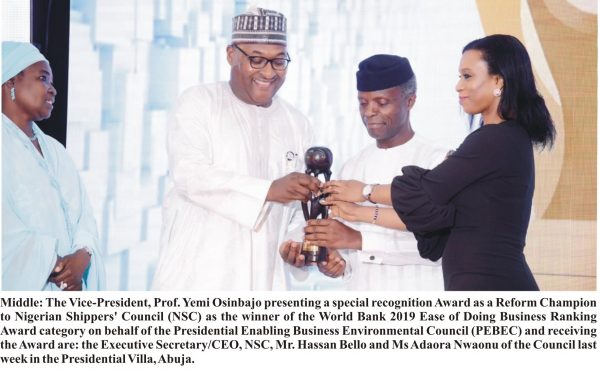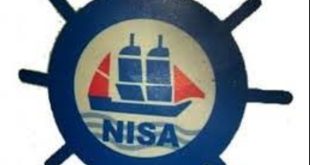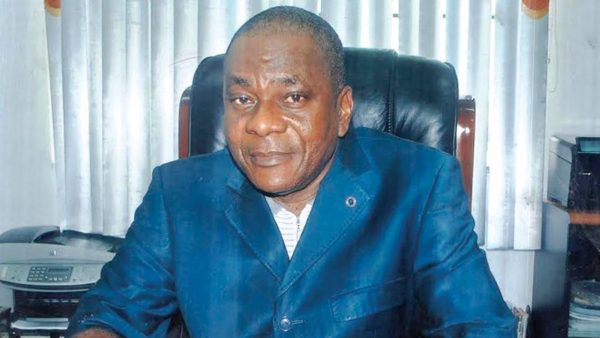 *8th National Assembly winds down without impact on maritime sector
*8th National Assembly winds down without impact on maritime sector
Disturbed by the seeming international conspiracy and its attendant stigmatization as well as the consequent spiral increase in prices of imported goods into the country, Nigeria has concluded plans to protest against the classification of her territorial waters as War Risk Zone at the Global Shippers’ Forum (GSF).
GSF is a global Non-Governmental Organization (NGO) with the mission to influence regulatory developments affecting international freight transport and the policy decisions of governments and international organizations as they affect shippers and receivers of freight.
Nigeria is a member as they represent shippers in all the world’s major trading regions, including Europe, Asia, North and South America, Africa and Australia.

MMS Plus gathered that the Nigerian Shippers’ Council (NSC) , which has been unsettled over the years with the unwarranted high war risk surcharge on Nigeria-bound cargo by the shipping lines will lead the protest for declassification.
According to the International Maritime Bureau (IMB), Nigerian shippers in the last three year have paid about $2.74 as insurance premium on vessels and cargoes destined for Nigeria account of what Nigerian maritime stakeholders described as wrong classification.
In addition to Nigeria, other African nations categorized as war risk countries are: Togo, Libya, Somalia, Benin Republic, Eritrea, the Gulf of Guinea, and some parts of Cameroon.
This classification, according to industry experts is done by international underwriters, who in cases declare certain areas “War risk zone” not because of an actual war but on account of piracy attacks.
Technically, war risk insurance is a type of insurance which covers damage due to acts of war, invasion, insurrection, rebellion and hijacking, which could be piracy in the case of West African countries. Some policies also cover damage due to weapons of mass destruction, and these are commonly used in the shipping and aviation industries.
However, the Executive Secretary/CEO of NSC, Mr. Hassan Bello who confirmed the planned protest by Nigeria against the categorization as war risk zone, said that the few incidents of armed robbery attacks on the nation’s territorial waters were not enough stigmatize the country.
“We are going to lead a protest and a discussion at the Global Shippers’ Forum on why Nigeria should be classified as a war risk nation when we don’t have war. There is also the classification of Nigeria as a nation of piracy when what we experience at sea is mere robbery incidents. It is also unfortunate that whatever happens in Togo is claimed to have taken place in Nigeria. Recently, there was an incident in Togo but they claimed the pirates were from Nigeria. It is grossly unfair and unethical.
“The point we are making here is that Nigeria is being targeted. And it is a public knowledge that Nigeria is making serious efforts to ward off this menace but these efforts even go unacknowledged. There is an existing relationship between the Nigerian Navy and the Nigerian Maritime Administration and Safety Agency (NIMASA) for a co-ordinated effort against this robbery and piracy at sea, they should be commended and encouraged to do more”, He added.
According to Bello, Nigeria at the Forum will seek to ascertain how the risk premium is arrived at and what constitutes the war risk in earnest.
“We do not deserve the war-risk tag on us. Our waters are safe. Again, we have to commend the Marine Police for greatly streamlining procedure for cargo clearance at the ports. The responsiveness of the new Inspector General of Police (IGP) has been remarkable,” Bello further noted.
Meanwhile, as the 8th National Assembly comes to end in few weeks, there is growing concern among stakeholders that not much would be achieved in terms of the over 500 pending Bills in the National Assembly before the legislative calendar ends on June 8, 2019.
In the maritime sector, there is nothing of note to celebrate as several crucial maritime industry bills are set to evade passage despite assurances by the Senate Committees and the colossal sums spent by the regulatory agencies to engage and enlighten the legislative on the importance of these bills.
Concerned stakeholders in the maritime sector have lampooned the Federal Government for the gross neglect of the sector as crucial bills like the Ports and Harbours bill, National Transport Commission bill, Anti-Piracy bill, among others are yet to be signed into law.
Other maritime bills before the National Assembly include: the Chartered Institute of Shipping of Nigeria (CISN) Bill; the Bill Establishing the Economic Regulator (shipping sector); the National Inland Waterways Authority Bill; the Maritime Security Agency Bill; and Nigeria Railway Bill, the Maritime Zones Bill.
Speaking with MMS Plus on this issue, a veteran maritime lawyer, Mr. Emeka Akabogu noted that the different bills may not have been affected by the same constraints as the approach given to the bills varied.
“Different approaches were deployed in the bid to get various maritime sector bills passed; unfortunately the results have turned out to be the same. I know for a fact that for the National Transport Commission (NTC) Bill, every single thing needed to be done, seemed to have been done. The National Assembly actually passed it but the President declined it”
Akabogu noted that the issues raised by the President for refusing assent were addressed because after the NTC bill was initially declined, the senate passed it once more.
“I know that the Shippers Council has been very proactive in chasing the National Transport Commission Bill, and there isn’t a reason why it should not have been passed” he said.
However, commenting on other industry bills, he maintained that there would be need for increased engagement of the National Assembly by the stakeholders and not the concerned agencies.
“I know that many of those bills have seen public hearing but I suspect that the National Assembly has not been proactive on those other bills as the NTC Bill. That is primarily a result of the approach in pushing the bill by the promoters. One of the things that the industry must take more seriously is the issue of lobbying. When there is a legislation which will be of value to a particular segment in the industry, that sector of the industry has to be keen in ensuring that the bill is passed. We cannot stand and expect magic to happen” he said.
He stressed that lobbying does not always involve spending money; rather it involves spending time for engagement.
“It is time we actively engage. The maritime industry has not been effective as far as that engagement is concerned. We would typically leave everything to the government. At times these government agencies have other concerns and if the bill which is more relevant to operators isn’t at the top of their priority, they would not pursue it. So, there has to be more strategic approach by stakeholders who have interest in bills to come together as industry groups and push active strategic lobbying and advocacy at the national assembly” he added.
Meanwhile, the Public Relations Officer (PRO) of the National Association of Government Approved Freight Forwarders (NAGAFF), Mr. Stanley Ezenga told our correspondent that the problem of port access roads and high cost of the nation’s ports are connected to the pending maritime sector bills.
“How can we talk about the ease of doing business at the ports when the road infrastructure is in such bad state? We need multimodal mode of transport to make the ports function optimally and NTC would have given an agency the responsibility for this, if it was passed” he lamented.
“When we talk about the transport sector development it should be holistic. Any meaningful development should cut across the rail, waterways, roads, piping and airways. Hence, a bill like the NTC would have been a major achievement for the 8th National Assembly as it would have set the template for the much needed transformation of the nation’s transport sector” he said.
According to the freight forwarding veteran, the fact that some of the gladiators in the 8th Assembly didn’t make it to the 9th Assembly means there would be sweeping changes and dire need for the maritime stakeholders to start afresh to engage, enlighten and lobby the National Assembly to pass these bills.
He stated that most individuals who get into the National Assembly are not grounded in the maritime industry.
“They don’t feel the pinch of the non-passage of these crucial maritime sector bills. The agenda for the 9th Assembly in my opinion would be to admonish those committees related to the maritime to find out the cost of using neighbouring ports and compare to Nigeria. They should also compare the level of efficiency and timeliness of port operations in Port of Lome, Port of Cotonou and Tema Port in Ghana. This is the agenda I’ll set for them because it would enable them appreciate how significant some of the bills are to the nation’s economy” he added.
 MMS PLUS NG – Maritime, Aviation, Business, Oil and Gas News Online Newspaper with coverage in Maritime, Oil and Gas, Aviation, Power and Energy as well as Financial News
MMS PLUS NG – Maritime, Aviation, Business, Oil and Gas News Online Newspaper with coverage in Maritime, Oil and Gas, Aviation, Power and Energy as well as Financial News









